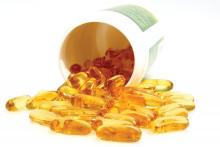Overall, about 74% of more than 2,800 supplements that were examined had labels that made at least one health claim, and only 19% included a U.S. Food and Drug Administration–reviewed qualified health claim (QHC).
The authors say “additional regulation” of the claims may be needed to prevent consumer misinformation. Notably, 20% of adults older than 60 years take fish oil supplements for heart health despite the fact that multiple randomized trials show no cardiovascular benefit.
“Based on what I’ve seen personally in the grocery store and pharmacy, I was not surprised to find such high rates of health claims on fish oil supplements,” lead author Joanna Assadourian, BSA, of UT Southwestern Medical Center, Dallas, said in an interview. “What was surprising, though, was just how broad the types of claims being made were – from heart and brain health to joint health, eye health, and immune function.”
Principal author Ann Marie Navar, MD, PhD, also of UT Southwestern, added, “As a preventive cardiologist, I tell my patients that if they are taking fish oil to try to avoid heart disease, then they can stop taking it because it’s not helping them. Their money would be better spent on something that will actually prevent a heart attack, like more fresh vegetables, their blood pressure or cholesterol medication, or a gym membership.”
The study was published online in JAMA Cardiology.
‘Vague statements’
To evaluate health claims made on fish oil supplement labels in the United States and to examine doses of eicosapentaenoic acid (EPA) and docosahexaenoic acid (DHA) in commonly available formulations, the investigators analyzed labels on supplements obtained from the National Institutes of Health Dietary Supplement Label Database.
The main outcomes were the frequency and types of health claims made on the labels, including use of an FDA-reviewed QHC versus a structure/function claim and the organ system referenced, as well as the total daily doses in combined EPA and DHA supplements from leading manufacturers and retailers.
QHCs are statements regarding a supplement’s or food’s potential to treatment or prevent disease. Such claims undergo evidence review by the FDA and include qualifying language that reflects lack of scientific consensus or uncertainty.
An example: “Consuming EPA and DHA combined may reduce the risk of CHD [coronary heart disease] by lowering blood pressure. However, FDA has concluded that the evidence is inconsistent and inconclusive. One serving of [name of the food or dietary supplement] provides [ ] gram(s) of EPA and DHA.”
By contrast, structure/function claims “describe the role of a nutrient or dietary ingredient intended to affect the structure or function in humans” but do not state that the supplement prevents, treats, or cures any disease. Such a claim “does not require any mitigating language regarding potential scientific uncertainty of the statement.”
Structure/function claims commonly state that the supplement “maintains,” “supports,” or “promotes” the function of certain organs. Examples are “promotes heart health” and “supports heart, mind and mood.”
Among 2,819 fish oil supplements, 2,082 (73.9%) made at least one health claim. Of these, only 399 (19.2%) used a QHC; the rest made only structure/function claims. In addition to heart-health claims, many fish oil supplements also have labels that make claims implying benefit to other organ systems, such as brain/mental health, joint health, and eye health – despite a lack of data from randomized clinical trials that support benefit.
The dose analysis of 255 fish oil supplements across 16 major brands found “substantial variability” in the daily dose of EPA (median interquartile range, 340 [135-647] mg/d), DHA (median IQR, 270 [140-500] mg/d), and total EPA+DHA (median IQR, 600 [300-1,100] mg/d).
Twenty-four (9.4%) of the supplements contained a daily dose of 2 g or more EPA+DHA.
“Significant heterogeneity exists in the daily dose of EPA+DHA in available supplements, leading to potential variability in safety and efficacy between supplements,” the authors conclude. “Increasing regulation of dietary supplement labeling may be needed to prevent consumer misinformation.”
Dr. Navar added, “We now need to understand what consumers are taking away from vague statements like ‘promotes brain health’ or ‘supports joint function’ – and test what language we can use to accurately describe the state of the science around fish oil and heart health.”

